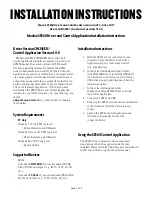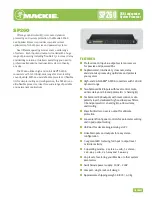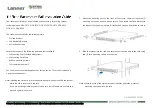
Errata
Specification Update
59
79.
Simultaneous Page Faults at Similar Page Offsets on Both Logical
Processors of a Hyper-Threading Technology Enabled Processor May
Cause Application Failure
Problem:
An incorrect value of CR2 may be presented to one of the logical processors of an HT
Technology enabled processor if a page access fault is encountered on one logical
processor in the same clock cycle that the other logical processor also encounters a
page fault. Both accesses must cross the same 4 byte aligned offset for this erratum
to occur. Only a small percentage of such simultaneous accesses are vulnerable. The
vulnerability of the alignment for any given fault is dependent on the state of other
circuitry in the processor. Additionally, a third fault from an access that occurs
sequentially after one of these simultaneous faults has to be pending at the time of
the simultaneous faults. This erratum is caused by a one-cycle hole in the logic that
controls the timing by which a logical processor is allowed to access an internal
asynchronous fault address register. The end result is that the value of CR2
presented to one logical processor may be corrupted.
Implication:
The operating system is likely to terminate the application that generated an
incorrect value of CR2.
Workaround:
An operating system or page management software can significantly reduce the
already small possibility of encountering this failure by restarting or retrying the
faulting instruction and only terminate the application on a subsequent failure of the
same instruction. It is possible for BIOS to contain a workaround for this erratum.
Status:
For the steppings affected, see the
Summary Tables of Changes.
80.
System Bus Interrupt Messages without Data Which Receive a
HardFailure Response May Hang the Processor
Problem:
When a system bus agent (processor or chipset) issues an interrupt transaction
without data onto the system bus and the transaction receives a HardFailure
response, a potential processor hang can occur. The processor, which generates an
inter-processor interrupt (IPI) that receives the HardFailure response, will still log the
MCA error event cause as HardFailure, even if the APIC causes a hang. Other
processors, which are true targets of the IPI, will also hang on hardfail-without-data,
but will not record an MCA HardFailure event as the cause. If a HardFailure response
occurs on a system bus interrupt message with data, the APIC will complete the
operation so as not to hang the processor.
Implication:
The processor may hang.
Workaround:
None identified.
Status:
For the steppings affected, see the
Summary Tables of Changes.
81.
Memory Type of the Load Lock Different from Its Corresponding
Store Unlock
Problem:
A use-once protocol is employed to ensure that the processor in a multi-agent
system may access data that is loaded into its cache on a Read-for-Ownership
operation at least once before it is snooped out by another agent. This protocol is















































